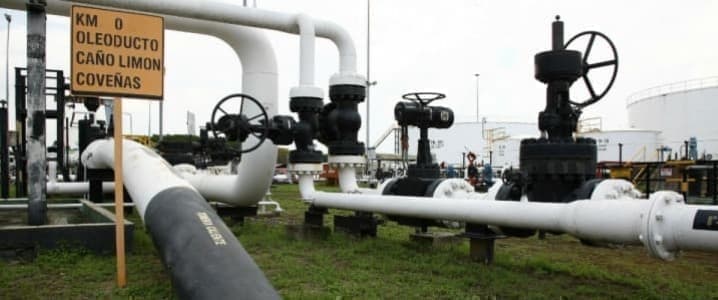After a positive start to 2020 there is little evidence of a sustained recovery for the Andean country’s economically crucial oil industry. Significantly weaker oil prices, the COVID-19 pandemic and a deteriorating internal security environment are weighing on Colombia’s oil industry. Investment and drilling activity remain weak despite claims by the Colombian Petroleum Association (ACP – Spanish acronym) that the outlook is improving. In what could be considered a significant blow for Colombia’s beaten down oil industry international energy company Occidental Petroleum announced that it had exited onshore Colombia. The combination of sharply weaker petroleum prices, lower than anticipated production and the measures taken to limit the spread of COVID-19 have had a marked impact on Colombia’s oil dependent economy. Government statistics agency DANE announced that the Andean country’s economy contracted by 15.7% during the second quarter 2020. The unemployment rate remains extremely high, at 16.8% for August 2020, despite falling by 4.6% from its May 2020 multi-decade peak of 21.4%. During August 2020 Colombia’s oil output averaged 742,091 barrels daily, which despite rising 1% compared to a month prior was a worrying 16% lower than for the same period in 2019. In a positive development, for a country experiencing an emerging natural gas crisis, that fossil fuels output climbed 9% month over month to a daily average of 1,020 million cubic feet, although that was still 8% lower than a year earlier.

Source: Colombia Ministry of Mines and Energy and U.S. EIA.
Major oil and natural gas discoveries remain elusive, which is a worrying development for Colombia because of its economic dependence on oil and limited proven reserves. I April 2020 Colombia’s Ministry of Mines and Energy announced that proven oil reserves had risen to just over two billion barrels with a limited production life of just over six years. That is a worrying development when it is considered there have been no major hydrocarbon discoveries during 2020 and none since 2009. This poses a direct threat to Colombia’s highly oil dependent economy, which prior to the August 2014 oil price collapse, was growing at one of the fastest rates in Latin America because of growing oil investment and production.
Related: China Sets Its Sights On Global EV Dominance
Despite rapidly expanding economic pressures, efforts by the Duque administration to boost energy investment, bolster exploration activity and realize Colombia’s considerable unconventional oil potential appear hamstrung. Considerable legislative uncertainty surrounding fracking combined with sharply weaker oil prices, community dissent and a deteriorating security environment are deterring energy majors from investing in Colombia. This is aggravated by Occidental’s decision to exit onshore Colombia. Earlier this month the international oil company announced the sale of its onshore Colombian assets. Occidental entered into an agreement with private equity firm Carlyle Group to sell acreage in the Llanos, Middle Magdalena and Putumayo Basins for approximately $825 million. Those properties are producing around 33,000 barrels of oil daily net. While Occidental stated it will retain an interest in offshore Colombian exploration blocks, it is a worrying development for the Andean country’s struggling petroleum industry. It was Occidental discovered the giant Cano Limon oil field in 1983, Colombia’s second largest oil field. There are fears that this will lead to lower investment with Occidental’s operational onshore assets likely to be placed into run-off mode.
Those fears are being fanned by the Andean country’s low rig count. Despite steadily increasing since May 2020, when it fell to one operational rig, there were only 12 rigs operating at the end of September, less than half the 29 operational drill rigs a year earlier. The volume of operational rigs is a sound proxy measure of activity in a country’s oil patch. As the chart indicates activity in Colombia’s hydrocarbon sector is still well below where it was in September 2017, 2018 and 2019.

Source: Baker Hughes and U.S. EIA.
It will take some time for Colombia’s oil production to return to pre-COVID-19 levels, particularly with Brent trading at around $40 per barrel which is below the breakeven price for many oil fields in the Andean country. Any sustained recovery is a long way off with the international Brent crude oil benchmark trading at $41 per barrel because it is estimated that the average breakeven price in Colombia is around $45 per barrel. That maybe too little too late for a country facing its worst recorded economic crisis. The IMF believes GDP will shrink 8.2% during 2020 and that could be worse with second quarter data from DANE showing a 15.7% quarterly contraction, or more than double the IMF’s estimate. Rising security risk and growing potential for civil unrest is also weighing on investment. If Duque’s administration cannot meet its security guarantees investment in petroleum exploration and production will be sharply impacted. For as long as oil prices remain low and security risk is heightened international energy companies will look to less risky jurisdictions with lower breakeven costs in which to invest. There is also the possibility, in the current difficult operating environment, that other energy companies will follow Occidental’s lead and exit the strife-torn Andean country as they seek to lower the risk profile of their operations and focus on more profitable assets.
By Matthew Smith for Oilprice.com
More Top Reads From Oilprice.com:
- Another Permian Giant May Be Forced To Consolidate Or Die
- The End Of Venezuela’s Oil Era
- This $40 Billion Pipeline Project Risks Becoming A Stranded Asset

















